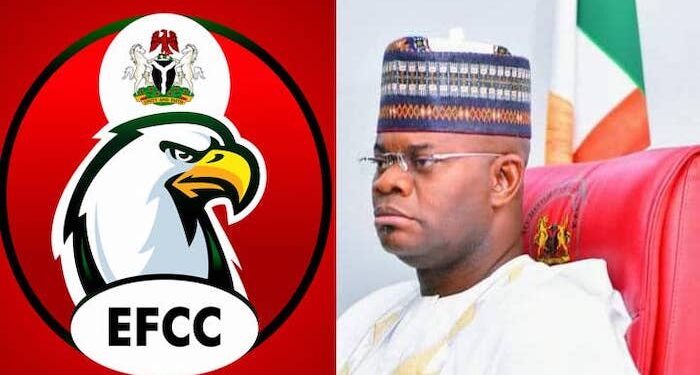EFCC Seeks Yahaya Bello’s trial in Absentia
The Economic and Financial Crimes Commission, EFCC, on Wednesday October 30, 2024 asked Justice Emeka Nwite of the Federal High Court sitting in Maitama, Abuja, to proceed with the trial of a former governor of Kogi State, Yahaya Bello in absentia, arguing that his non-appearance in court for arraignment should not be allowed to frustrate his trial.
The EFCC through its lead counsel, Kemi Pinheiro, SAN, also urged the court to enter a plea of “not guilty” on behalf of Bello.
Bello is facing trial on 19-count charges bordering on money laundering to the tune of N80.2billion. The court had summoned him for arraignment six consecutive times.
Pinheiro told the court that the former governor’s refusal to appear for his arraignment was malicious and that the court should not demonstrate helplessness by not trying him in absentia. “A court can never demonstrate helplessness. That would be an indication of anarchy and society is based on the rule of law. The court demonstrating helplessness will negate the basis of the rule of law,” he said.
Arguing further, the EFCC’s counsel reminded the court that a defendant’s refusal to engage the court’s processes should not frustrate his trial, maintaining that justice is a three-way mechanism. “A criminal trial must not be held hostage, truncated or frustrated by a defendant’s refusal to engage the process. Justice is a three-way street: justice to the defendant, justice to the prosecution who has assembled witnesses and justice to the society”.
Earlier in his submissions, he urged the court to enter a not guilty plea for Bello to pave the way for his trial contending that under Section 276 of the Administration of Criminal Justice Act, ACJA, a defendant’s physical presence in court is not an absolute requirement for arraignment. “The right to plead guilty or not guilty is a right that can be waived by the defendant,” adding that Bello’s absence should not impede the case.
“My first application is to formally enter a plea of not guilty to the defendant, even in his absence. The second point is, notwithstanding his physical absence, trial can proceed. What prejudice will the defendant suffer if my lord enters a plea of guilty or not guilty in his absence? Even if he was in court and pleaded not guilty, the situation would still be the same. The entry of a plea of not guilty by your lordship is an invitation to the prosecution to come and prove the veracity of the allegations”, he said.
In response, counsel for the defendant, Michael Adoyi, opposed the prosecution’s motion, citing a previous court order requiring the defendant’s presence before any applications could be entertained. He emphasized that the application was contrary to the court’s directive issued earlier. “Our first point of response to the application made by the learned senior counsel to the complainant is that the application is made contrary to the subsisting order of this honourable court, even made this morning, that no application can be entertained by this court in the absence of the arraignment of the defendant,” he said.
Pinheiro rebutted Adoyi’s argument, urging the court to reject the defence’s position and proceed with the plea entry, assuring that it would not infringe on the defendant’s rights or affect the trial’s fairness.
Justice Nwite, after listening to both parties, noted that a ruling on the matter may not be possible within the current year due to court schedules. “It may not be possible to deliver this ruling this year. Pinheiro proposed that the matter be adjourned for ruling and arraignment, which Justice Nwite granted, adjourning the case until January 21, 2025.
● By Dele Oyewale,Head, Media & Publicity, EFCC.


